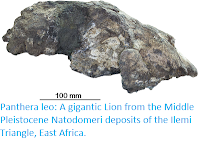Police in Limpopo Province, South Africa, are trying to determine the identity of a man found dead in the Ingwelala Private Nature Reserve in Limpopo Province, South Africa, on Saturday 10 February 2018. The man had been largely eaten by Lions, though his head and some other body parts had were left, and he is presumed to have been poaching in the park as he was found next to a high-powered riffle of a kind favoured by poachers and did not have any legitimate reason to be in the park.
A Lion in the Ingwelala Private Nature Reserve in Limpopo Province, South Africa. Jacques Rossouw/Ingwelala Private Nature Reserve.
Lions are currently listed as Vulnerable under the terms of the International Union for the Conservation of Nature's Red List of Threatened Species, as they underwent a 43% decline in population globally during the period 1993-2014 (roughly three generations in Lion terms). This decline has largely been fuelled by habitat loss, combined with deliberate killing of the animals to protect Humans, and their livestock, expanding their range into the Lion's territory. However the species has actually undergone an increase in population size in four Southern African countries (Botswana, Namibia, South Africa and Zimbabwe), where large wildlife parks are heavily protected against incursion and poaching to protect other species. Lions are sometimes deliberately targeted by poachers within game reserves, as their bones are used in some traditional African medicine or traded in Asia as the more sort after bones of Tigers, but it is likely that if the victim was poaching in the park that he was looking for more conventional prey, such as antelope for eating or Rhinoceros or Elephant for their more widely traded horns and tusks, and that his encounter with the Lions was simply bad luck and/or lack of experience of hunting in Lion territory.
See also...
Follow Sciency Thoughts on Facebook.







